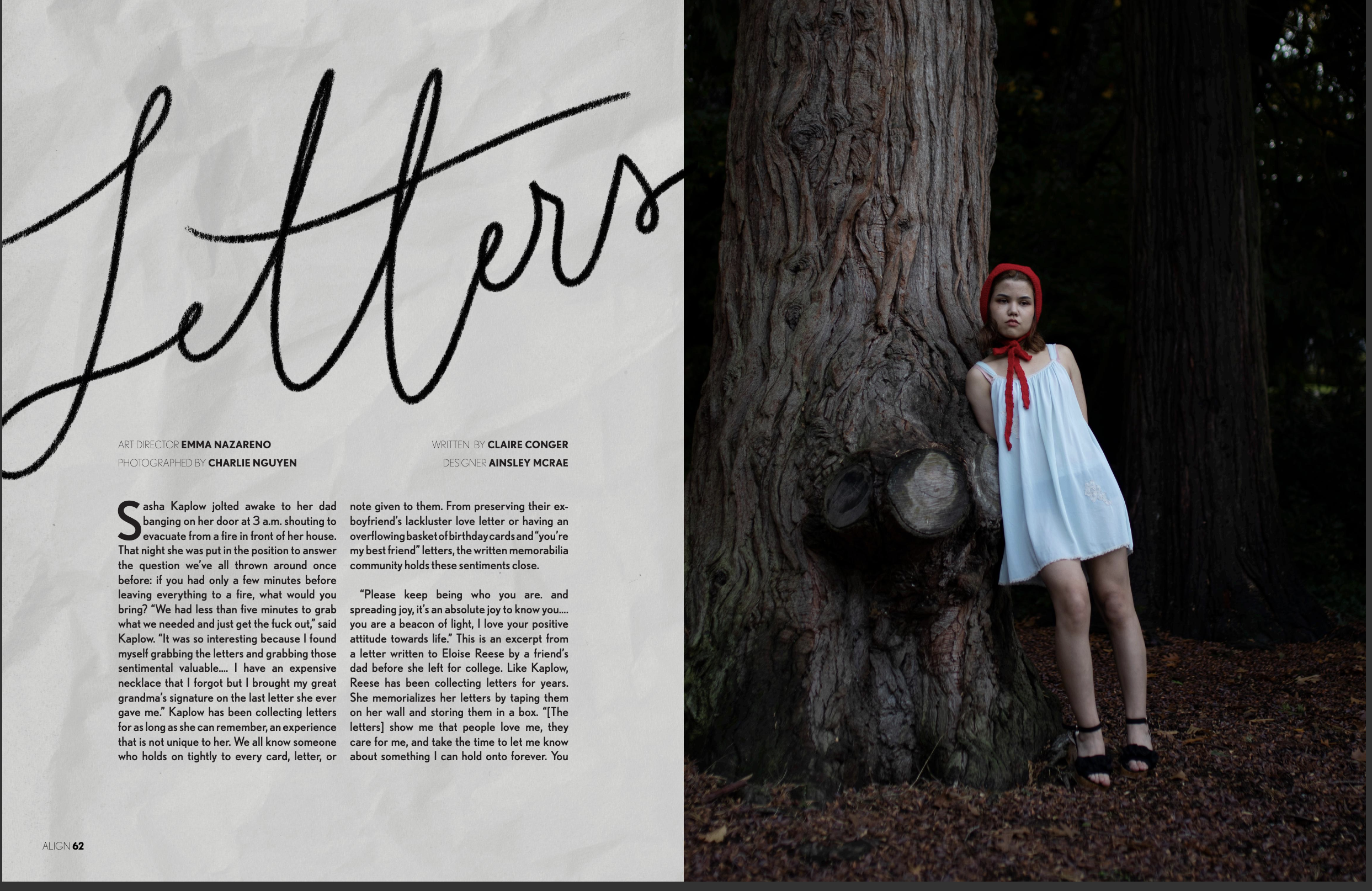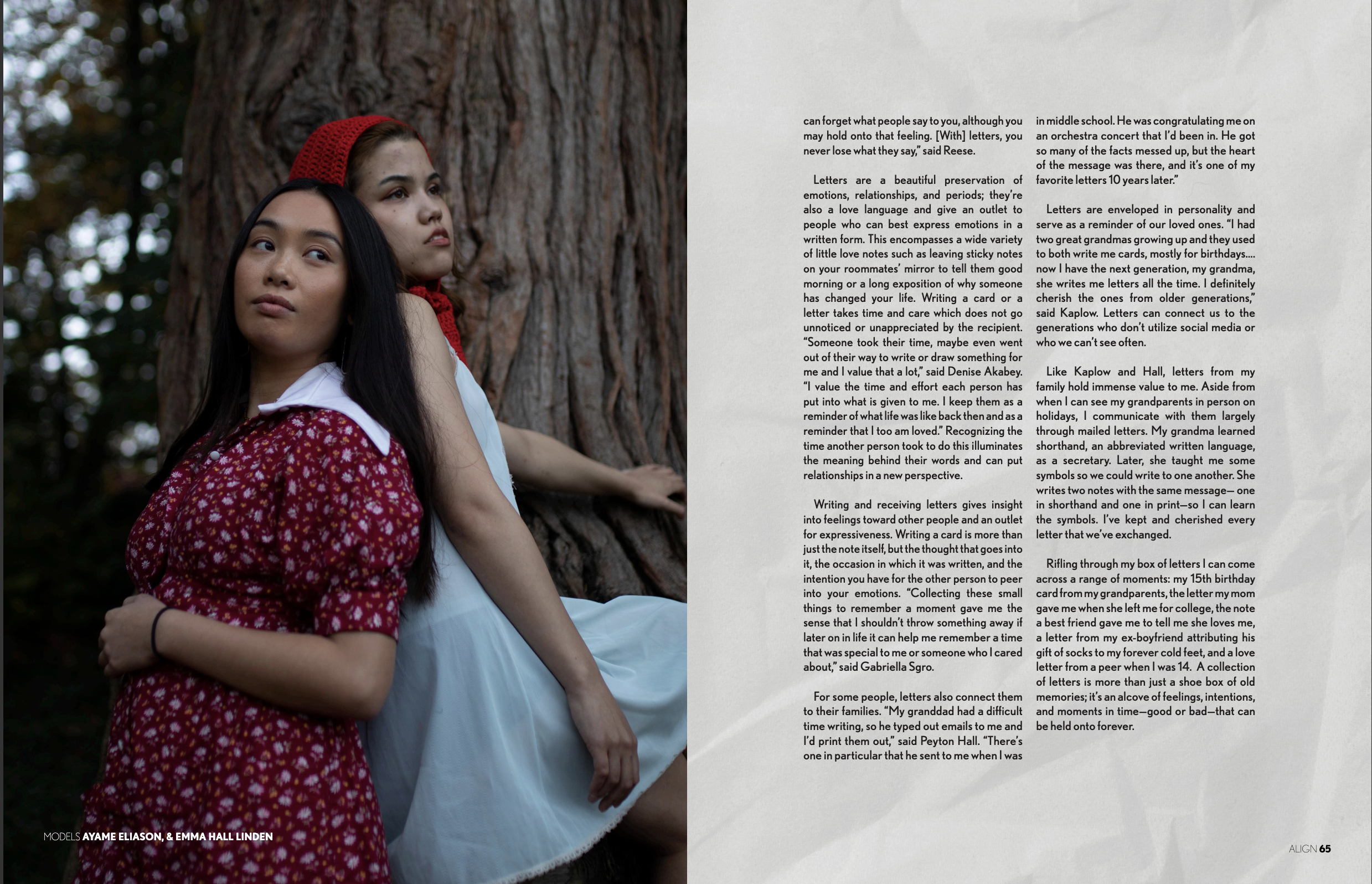Letters
By Claire Conger
December 9, 2022
Sasha Kaplow jolted awake to her dad banging on her door at 3 a.m. shouting to evacuate from a fire in front of her house. That night she was put in the position to answer the question we’ve all thrown around once before: if you had only a few minutes before leaving everything to a fire, what would you bring? “We had less than five minutes to grab what we needed and just get the fuck out,” said Kaplow. “It was so interesting because I found myself grabbing the letters and grabbing those sentimental valuables…. I have an expensive necklace that I forgot but I brought my great grandma’s signature on the last letter she ever gave me.” Kaplow has been collecting letters for as long as she can remember, an experience that is not unique to her. We all know someone who holds on tightly to every card, letter, or note given to them. From preserving their ex-boyfriend's lackluster love letter or having an overflowing basket of birthday cards and “you’re my best friend” letters, the written memorabilia community holds these sentiments close.
“Please keep being who you are. and spreading joy, it’s an absolute joy to know you…. you are a beacon of light, I love your positive attitude towards life.” This is an excerpt from a letter written to Eloise Reese by a friend’s dad before she left for college. Like Kaplow, Reese has been collecting letters for years. She memorializes her letters by taping them on her wall and storing them in a box. “[The letters] show me that people love me, they care for me, and take the time to let me know about something I can hold onto forever. You can forget what people say to you, although you may hold onto that feeling. [With] letters, you never lose what they say,” said Reese.
Letters are a beautiful preservation of emotions, relationships, and periods; they’re also a love language and give an outlet to people who can best express emotions in a written form. This encompasses a wide variety of little love notes such as leaving sticky notes on your roommates' mirror to tell them good morning or a long exposition of why someone has changed your life. Writing a card or a letter takes time and care which does not go unnoticed or unappreciated by the recipient. “Someone took their time, maybe even went out of their way to write or draw something for me and I value that a lot,” said Denise Akabey. “I value the time and effort each person has put into what is given to me. I keep them as a reminder of what life was like back then and as a reminder that I too am loved.” Recognizing the time another person took to do this illuminates the meaning behind their words and can put relationships in a new perspective.
Writing and receiving letters gives insight into feelings toward other people and an outlet for expressiveness. Writing a card is more than just the note itself, but the thought that goes into it, the occasion in which it was written, and the intention you have for the other person to peer into your emotions. “Collecting these small things to remember a moment gave me the sense that I shouldn't throw something away if later on in life it can help me remember a time that was special to me or someone who I cared about,” said Gabriella Sgro.
For some people, letters also connect them to their families. “My granddad had a difficult time writing, so he typed out emails to me and I’d print them out,” said Peyton Hall. “There’s one in particular that he sent to me when I was in middle school. He was congratulating me on an orchestra concert that I’d been in. He got so many of the facts messed up, but the heart of the message was there, and it’s one of my favorite letters 10 years later.”
Letters are enveloped in personality and serve as a reminder of our loved ones. “I had two great grandmas growing up and they used to both write me cards, mostly for birthdays….now I have the next generation, my grandma, she writes me letters all the time. I definitely cherish the ones from older generations,” said Kaplow. Letters can connect us to the generations who don’t utilize social media or who we can’t see often.
Like Kaplow and Hall, letters from my family hold immense value to me. Aside from when I can see my grandparents in person on holidays, I communicate with them largely through mailed letters. My grandma learned shorthand, an abbreviated written language, as a secretary. Later, she taught me some symbols so we could write to one another. She writes two notes with the same message— one in shorthand and one in print—so I can learn the symbols. I’ve kept and cherished every letter that we’ve exchanged.
Rifling through my box of letters I can come across a range of moments: my 15th birthday card from my grandparents, the letter my mom gave me when she left me for college, the note a best friend gave me to tell me she loves me, a letter from my ex-boyfriend attributing his gift of socks to my forever cold feet, and a love letter from a peer when I was 14. A collection of letters is more than just a shoe box of old memories; it's an alcove of feelings, intentions, and moments in time—good or bad—that can be held onto forever.

